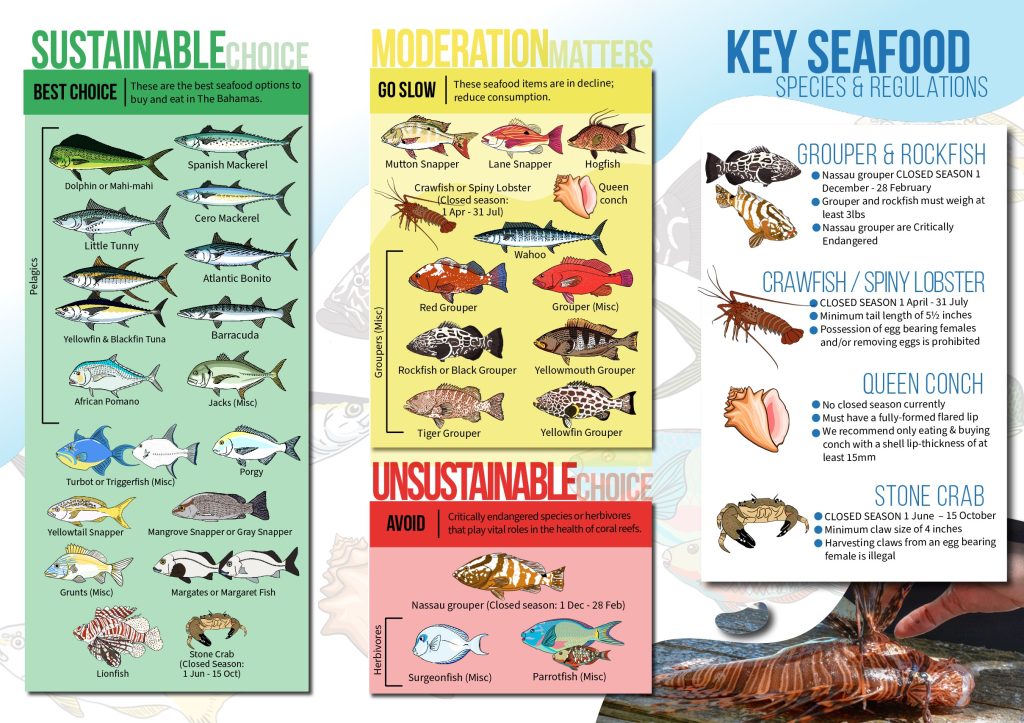Why Sustainable Seafood Matters

Across the Caribbean, the ocean is more than a scenic backdrop—it’s vital to our economies, cultures, and day-to-day life. But these marine resources face serious threats from overfishing, habitat loss, and climate change. By choosing sustainable seafood, you help protect fragile ecosystems, preserve local traditions, and support the people who depend on healthy oceans for their livelihoods.
Our Approach
Science + Local Know-How
At Perry Institute for Marine Science, we rely on the best available data, local expertise, and ongoing research to guide our sustainability recommendations. Conditions in the sea can change quickly, and our understanding evolves alongside them. That’s why we regularly update our guidelines, ensuring you have the most current info on how to enjoy seafood responsibly
Download Our Sustainable Seafood Guide

We’ve developed a color-coded system to help you make smart choices at a glance, based on the best available science in The Bahamas.
Best Choice (Green)
These species have healthier populations or are harvested using more sustainable methods. Enjoy them freely, but remain mindful of local regulations.
Go Slow (Yellow)
These species may be under pressure or in decline. We suggest cutting back on how often you eat them, or looking for greener alternatives when possible.
Don’t Eat (Red)
These species are greatly threatened or crucial for reef health. We recommend avoiding them to help them recover and to keep our reefs thriving.
Simple Steps to Help

Reduce your consumption of threatened or overfished species (marked in red in our seafood guide).
Choose Green options first to support more sustainable fisheries.
Pass on herbivores like parrotfish and surgeonfish—these algae-eaters help keep coral reefs healthy.
Respect Local Regulations by only buying and eating seafood in season, of legal size, and from reputable vendors who follow the rules.
By taking these steps, you protect not only fish populations but entire ecosystems, ensuring that future generations can rely on the ocean for food, work, and a sense of cultural identity.
Key Species & Seasonal Guidelines
Note: Regulations and closed seasons vary across the Caribbean. Check your local fisheries office or government website for island-specific rules. Below are guidelines commonly used in The Bahamas, which can serve as a template.

Grouper & Rockfish (e.g., Nassau grouper)

Closed Season: December 1 – February 28 (Bahamas)
Minimum Catch Weight: 3 lbs (Bahamas)
Nassau Grouper is Critically Endangered. If you’re unsure of local regulations where you are, ask a trusted fishmonger or restaurant.
Spiny Lobster (Crawfish)

Closed Season: April 1 – July 31 (Bahamas)
Minimum Tail Length: 5½ inches
Possessing egg-bearing females or removing eggs is illegal. Always verify your local rules.


Queen Conch

No Official Closed Season (in many places, though this can change)
Size Matters: Look for fully formed flared lips and a shell lip thickness of at least 15 mm (about the thickness of a Bahamian one-cent coin or a small paperclip). Thin-lipped conchs are usually juveniles, and catching them damages future stocks.
Stone Crab

Closed Season: June 1 – October 15 (Bahamas)
Minimum Claw Size: 4 inches
Harvesting claws from egg-bearing females is illegal. Always handle with care to avoid damaging the crab unnecessarily.

Using the Best Available Science

In much of the Caribbean, and particularly in The Bahamas, detailed stock assessments aren’t always available for every seafood species. To support sustainable fishing, we use the best available science, local expertise, and ongoing research. Marine ecosystems change, and so does our understanding of them. That’s why our guidelines evolve with new data and insights—we’re always refining what “sustainability” means on the ground (and in the water). It’s how we protect the region’s precious resources and keep fishing communities thriving for generations to come.

Research

PIMS spearheads innovative fisheries and sustainable seafood research in The Bahamas. Our mission is to highlight the significant benefits of sustainable fishing practices for education, economic growth, and community resilience.
Let's Stay Connected

Be part of our growing community dedicated to restoring coral reefs and protecting marine life. Subscribe for inspiring stories, research insights, job opportunities, and ways to get involved.



